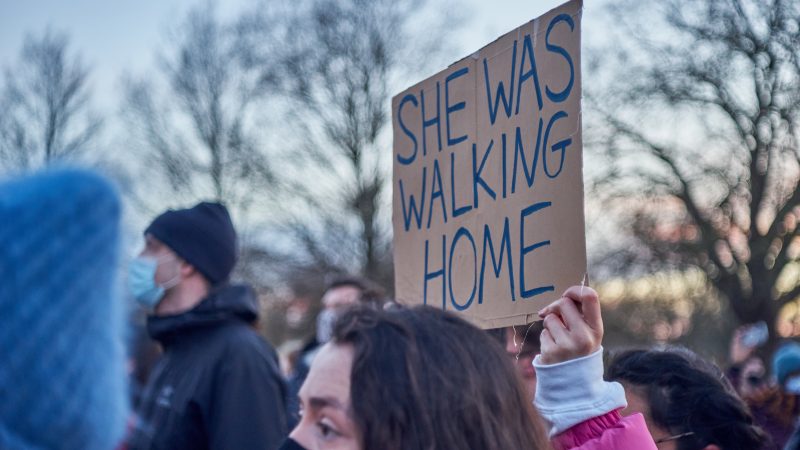
In the two and a half years since the murders of Sarah Everard, Bibaa Henry and Nicole Smallman sparked outrage across the country and collective demands for change, women and girls continue to be harmed and killed by men. Sabina Nessa, Zara Aleena, Bobbi-Anne McLeod and just last week, 15 year old Elianne Andam.
Elianne’s murder on her way to school has been predominantly framed as knife crime by a media which racialises this issue as one that predominantly affects Black boys. However, we cannot ignore that this story is also one of violence against women and girls, as details to date suggest that Elianne was killed defending her friend who had rejected the romantic advances of her attacker; repeating a pattern seen across cases of domestic abuse, with escalated risk of violence post-separation.
We live in a culture that justifies and normalises male violence in the context of romantic relationships – a culture in which inequality and harmful social attitudes reproduce boys and men’s sense of entitlement to our bodies, time and affection, and sees women and girls as conquests and disposable. This is the reality that we find ourselves in despite countless promises from our political leaders and justice agencies to prioritise tackling violence against women and girls (VAWG) – backed up by a Tackling VAWG strategy.
Last month, End Violence Against Women Coalition and 70 expert women’s organisations launched a manifesto for the 2024 General Election, calling on all political parties to adopt its principles and commit to its recommendations for ending this abuse. This means looking beyond the criminal justice system alone and delivering a comprehensive, whole-society approach to tackling VAWG that centres those who face the greatest barriers to support and protection.
While the criminal justice system urgently needs reform, not least to address the routine disclosure of rape survivors’ counselling notes and the lack of independent legal advice available to them, the ambition cannot stop here.
If we want to end this violence, we need to first understand that it is the product of a deeply unequal society, and work to change the cultural attitudes that justify and tolerate VAWG, that blame and disbelieve victims, and that uphold a collective mindset that views this abuse as a normal and inevitable part of life. We know that a different world is possible, but to get there we need an approach that prioritises and invests in preventing this violence, instead of waiting and acting only when the harm is done.
This looks like going beyond the criminal justice system for solutions and sustainably funding vital specialist support services that help survivors recover and meet their holistic needs. It means scrapping No Recourse to Public Funds for survivors of VAWG and ending the hostile environment, so that migrant victims aren’t forced to stay with a perpetrator for fear of facing immigration enforcement, detention and removal from the UK.
It means taking a human rights-based and whole-society approach to tackling this issue and pouring our attention and funding into our schools and education institutions. Quality Relationships and Sex Education, a Whole School Approach to tackling VAWG and public attitude campaigns play a key role here.
Amid ongoing threats to tools which are vital to protecting women and girls from violence, such as the Human Rights Act, the European Convention on Human Rights and the UN Refugee Convention, we are seeing that a rise in rhetoric around ending VAWG does not always result in action to make that a reality. Women and girls cannot afford for the next government to repeat the same story.
We’ll explore these issues and more at the Labour Party conference on Tuesday 10th October, in a panel made up of Women’s Aid Federation England, Latin American Women’s Rights Service, Respect, Women and Equalities Select Committee member Bell Ribeiro-Addy MP, new Shadow Victims and Sentencing Minister Kevin Brennan MP, and chaired by the End Violence Against Women Coalition.
A Manifesto for Ending Violence Against Women and Girls
Tuesday, 8.45 – 9.45am / Meeting Room 21, ACC Liverpool / with Ellie Reeves MP, Bell Ribeiro-Addy MP, Andrea Simon (EVAW Coalition), Farah Nazeer (Women’s Aid), Gisela Valle (Latin American Women’s Rights Service), Caroline Bernard (Respect)
Read more from LabourList’s conference coverage:
GUIDES:
- What, when and where are the best events today?
- The unmissable full LabourList events programme
- ‘Labour conference 2023: How to make the most of it – for veterans and first-timers’
NEWS:
- Conference policy tracker: What has been announced so far?
- Labour conference 2023: Full list of 12 topics party will vote on
- The 49 issues supporters wanted the party to debate
- Green activists protest over policy rowbacks
- McDonnell says Labour “planning to fail” with its economic policies
- Labour must put health and wellbeing at the “core of its schools policy”
COMMENT AND SPEECHES
- ‘We need political action to end violence against women, not just rhetoric’
- Rayner’s full 2023 conference speech: ‘We have a plan to make Britain better’
- ‘Full HS2 is essential. Labour should keep its options open and not sell off land’
- ‘Braverman’s rhetoric is chilling. Labour must unequivocally support refugees’




More from LabourList
‘The hope that kills you’: Reflections from the final day in Gorton and Denton
MPs, union leaders and organisations react to ‘bruising’ Gorton and Denton result
A gory night for Labour